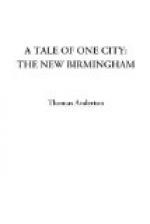There are, however, matters concerning the earlier days of Cambridge Street Works that well deserve to be recognised and recorded. I think, indeed, I may say that Mr. R.W. Winfield was the local pioneer of compulsory education. There were, of course, a large number of boys employed at the works, and Mr. Winfield not only provided an evening school for these young hands but compelled them to attend and be educated whether they liked it or not.
At the time mentioned, I remember, Mr. James Atkins—then a manager of one of the departments—had a large hand in the educational operations carried on in connection with the Cambridge Street manufactory. He had the happy knack of attracting boys to him, and could interest those he taught and teach those he interested. Mr. Atkins, as is well known, afterwards became the principal of the firm, but more of this anon.
In the work of these evening schools, Mr. John Fawkener Winfield, son of Mr. R.W. Winfield, took a very active interest. He used to give some excellent lectures, and constantly taught in the classes. Much money was spent upon these schools; indeed, a large room was specially built, at very considerable cost, in order that the educational work might have elbow room and be carried on effectually.
Mr. Winfield was a stiff, unbending man in some matters—especially in politics—but he was in many respects broad-minded and large-hearted. He was thoughtful for those in his employ, especially the young people, and his son was like unto him.
When I was engaged at Cambridge Street Works Mr. R.W. Winfield lived at the Hawthorns, Ladywood Lane. The house seemed by comparison to be a large and important mansion, and was quite in the country then. Yes, I remember now, at this distance of time, how often our employer used to give us treats at his house, and what pleasant jinks we had in playing and rollicking about the fields and grounds surrounding his residence.
In many respects Mr. R.W. Winfield was one of the real old school. He was not a high or broad so much as a good, thick, consistent churchman of the Evangelical school. He “wore his beaver stiffly up,” his neck-tie was a starched white cravat, his clothes were black broadcloth, with the dress coat worn by gentlemen in the early and middle years of last century. All the same, he had some modern ideas, especially, as I have said, in the matter of education. If it came to be totalled up how much he spent on the education of the boys in his employ, the aggregate sum would run to large figures.
Time, we know, smooths the surface or rounds off the corners of past events that seemed rather arbitrary at the time of their occurrence. But, after making allowance for all this, my experience of Mr. Winfield’s evening schools is occasionally wafted back to me with many pleasant memories and associations. Compulsory education was the iron hand that directed the young ideas how to shoot, though it was enveloped in a soft velvet glove. Mr. Winfield did good far-reaching work by the establishment and maintenance of his evening schools, and his thoughtfulness and generosity in this direction should be counted unto him for righteousness.




